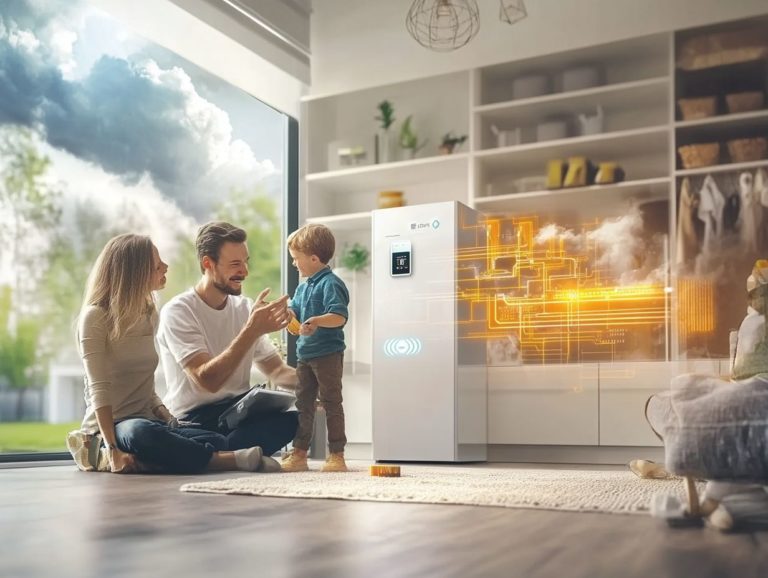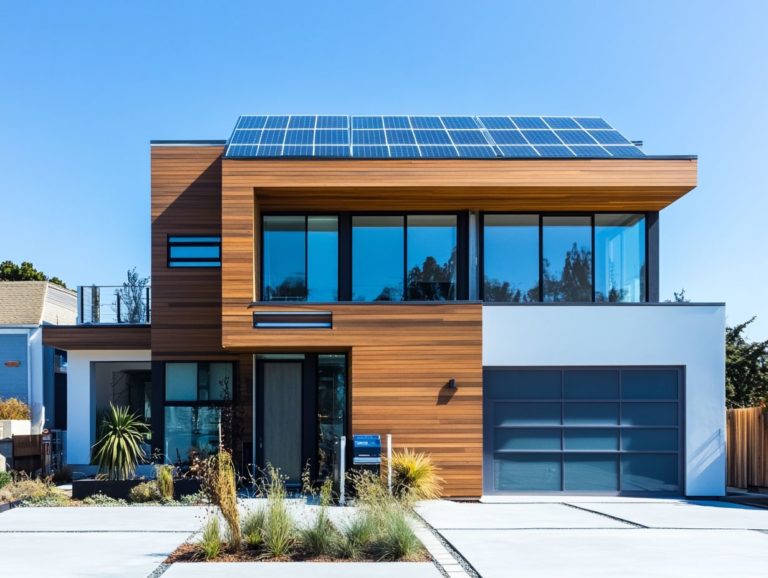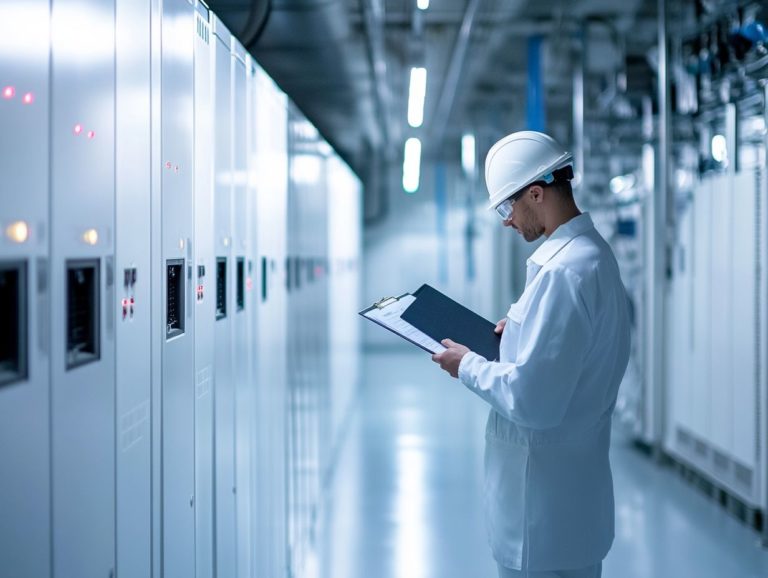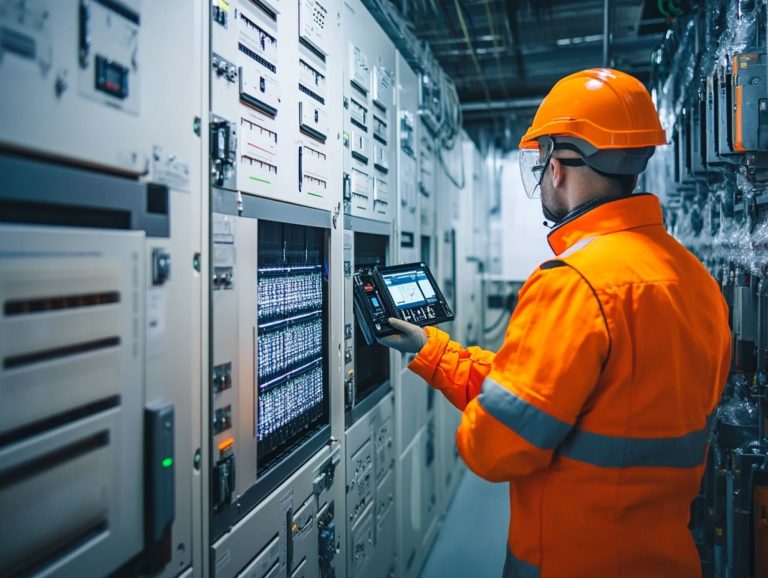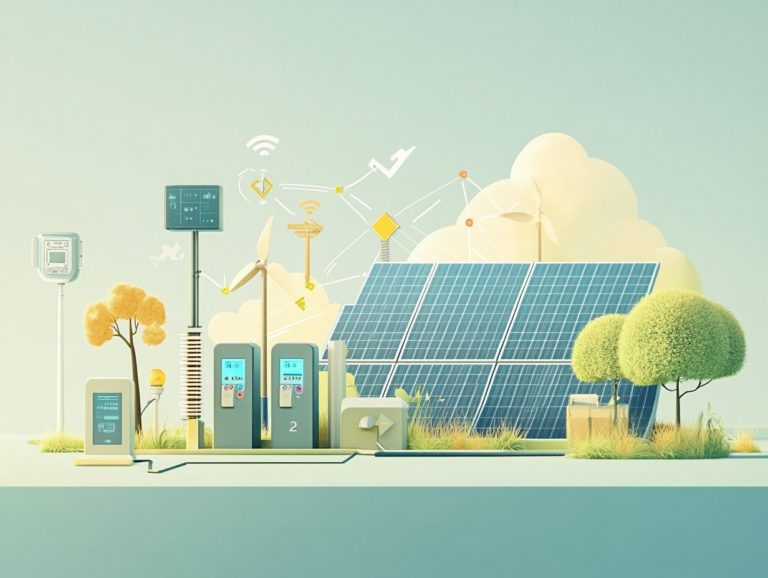Energy Storage for Home Backup Power: What to Know
In an increasingly unpredictable world, securing a reliable backup power system for your home has never been more essential.
Whether you’re facing a sudden storm, an unexpected power outage, or simply seeking energy independence, you need to understand the different energy storage options available to you.
This article explores the various choices at your disposal, highlights key factors to consider when selecting your system, and outlines the benefits of investing in home backup power.
Discover how you can achieve peace of mind and convenience while potentially lowering your energy costs.
Contents
- Key Takeaways:
- Types of Energy Storage for Home Backup Power
- Factors to Consider When Choosing an Energy Storage System
- Benefits of Having a Home Backup Power System
- Frequently Asked Questions
- What is energy storage for home backup power?
- Why should I consider energy storage for home backup power?
- What types of energy storage systems are available for home backup power?
- How long can energy storage systems power my home during an outage?
- Does energy storage for home backup power require maintenance?
- Are there any incentives or rebates for installing energy storage for home backup power?
Key Takeaways:
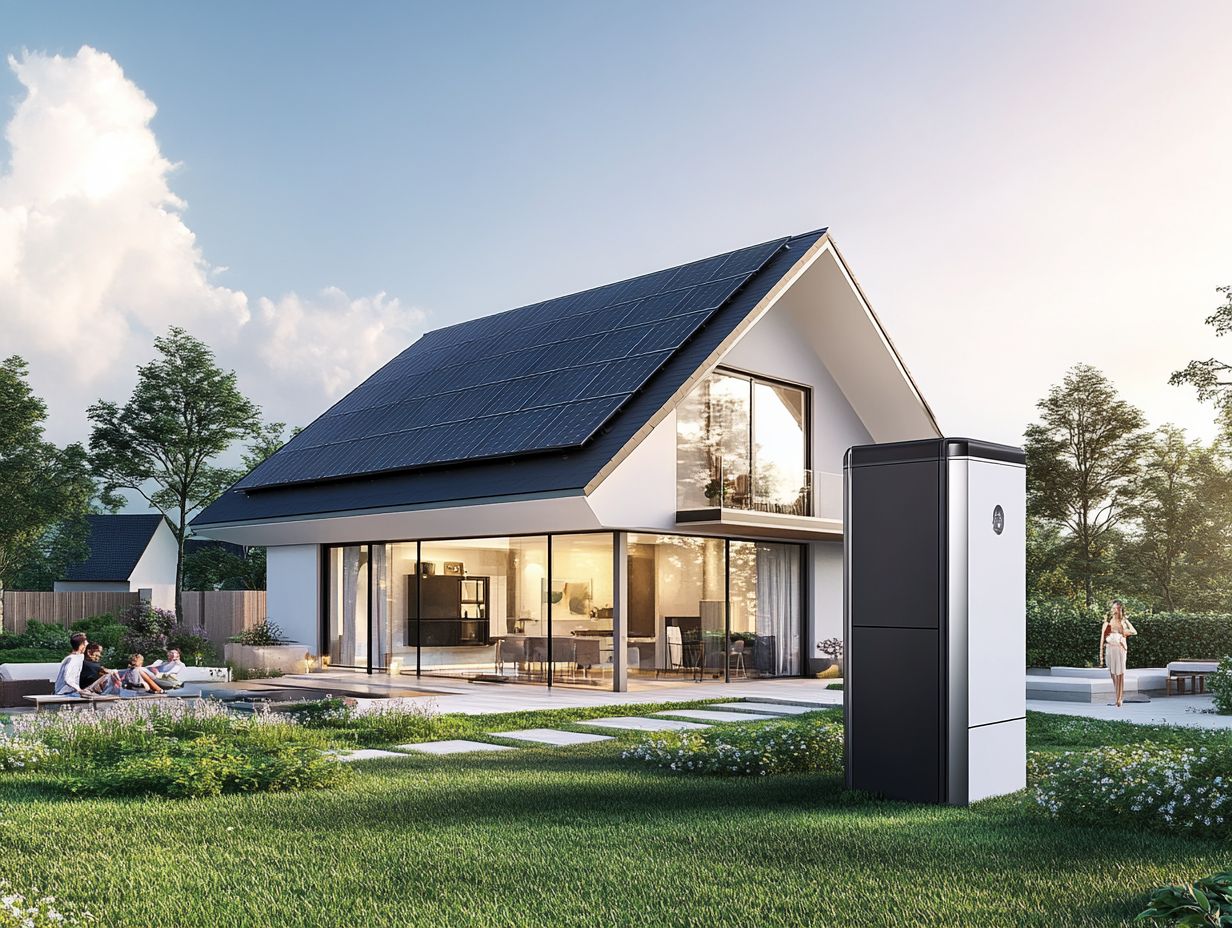
- Backup power ensures your home stays energized during emergencies.
- Consider battery, generator, and solar systems for your backup needs.
- Evaluate your power needs and installation location carefully.
Why is Backup Power Important?
Backup power is vital for homeowners seeking energy independence, especially in areas prone to power outages or disruptions caused by climate change.
With an efficient energy storage system, such as lithium-ion or lead-acid batteries, you can maintain access to electricity even when the grid falters. This ensures that your daily activities and critical devices remain operational.
This reliance on backup power enhances your convenience and contributes to independence from power companies, potentially saving you money on electric bills.
Beyond providing uninterrupted power, these systems improve your home s safety during emergencies. They ensure vital appliances like medical devices and refrigeration continue functioning.
Integrating solar panels amplifies these benefits, allowing you to harness renewable energy and engage in net metering, which lets you sell surplus electricity back to the grid.
Energy storage solutions promote energy efficiency and can lead to substantial financial savings over time, creating a resilient energy plan that prepares you for unpredictable conditions.
Types of Energy Storage for Home Backup Power
When exploring energy storage options for home backup power, you ll find a variety of systems, each with distinct features and advantages.
Battery storage systems, like lithium-ion and lead-acid batteries, provide efficient and dependable energy management. Generator systems ensure a consistent supply of electricity during extended outages.
Combining solar power systems with energy storage boosts your independence from power companies and lowers utility costs. This combination allows you to harness renewable energy effectively through solar-plus-storage solutions.
Battery Storage Systems
Battery storage systems play a crucial role in managing energy in your home, with options like lithium-ion and lead-acid batteries, each offering unique advantages.
Lithium-ion batteries are known for their efficiency and longevity, making them ideal for energy management and capacity storage.
Lead-acid batteries, while not as efficient, provide a budget-friendly solution for backup power needs in many households.
When evaluating these options, it s essential to consider not just the initial purchase price but also long-term performance and the ability to meet your energy demands over time.
Lithium-ion models typically last 10-15 years, significantly outlasting lead-acid variants, which might only last around 3-5 years, depending on usage.
The impressive cycling ability of lithium-ion batteries without losing charge capacity makes them a superior choice for homes that rely heavily on solar energy or other renewable sources.
Lead-acid batteries may be more suitable for less frequently used systems, such as emergency power setups, where keeping costs low is a priority.
Ultimately, understanding these key differences empowers you to make informed decisions tailored to your specific energy management needs.
Generator Systems
Generator systems are your dependable backup power solution during outages. They offer an alternative for homeowners who may not yet have energy storage options.
These systems can operate on various fuels, including gasoline, diesel, or natural gas, ensuring that your home remains powered even when the grid fails. This enhances your energy independence and reduces reliance on utility companies.
Each type of generator comes with its own set of advantages and limitations.
- Gasoline generators are typically more portable and simpler to refuel, making them perfect for short-term use. However, they may be less efficient and require more frequent maintenance.
- Diesel generators are known for their durability and fuel efficiency, making them ideal for long-term applications. They can be bulkier and produce more emissions.
- Natural gas generators, often connected directly to home gas lines, offer a convenient and clean energy source. Their installation can be more complex.
No matter which type you choose, understanding these generator systems can significantly enhance your preparedness for unexpected power outages.
Solar Power Systems
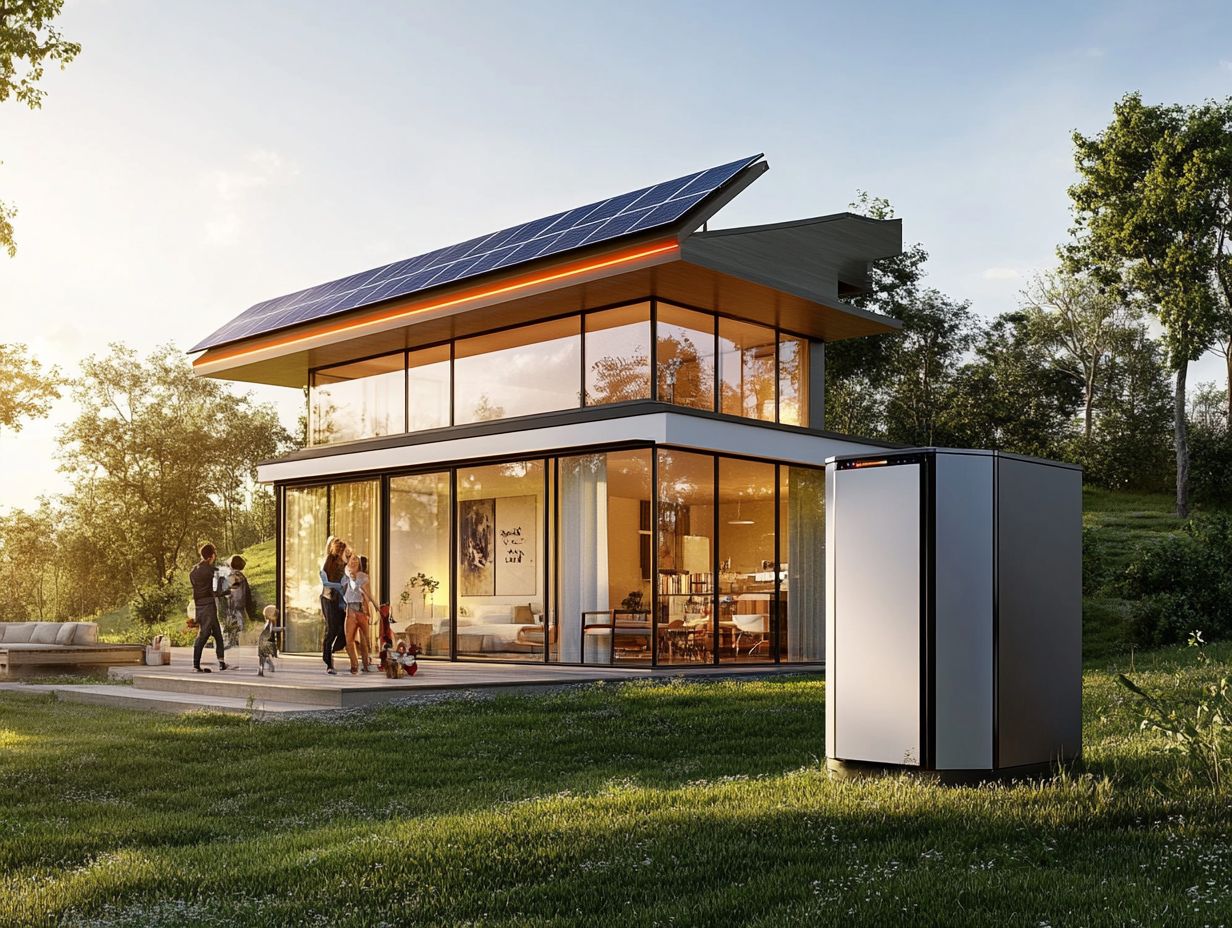
Solar power systems, complete with advanced solar panels, offer a sustainable and eco-friendly way to generate and store energy. They allow you to achieve a sense of grid independence.
With these systems, you can harness the renewable energy of the sun while integrating energy storage solutions for backup power. It s a savvy move for anyone looking to cut down on electric bills and take a stand against climate change!
Solar power systems also provide reliable energy. They significantly reduce your dependence on fossil fuels, leading to a decrease in greenhouse gas emissions.
By embracing innovative technology, these systems ensure sustainability while paving the way for long-term savings through lower utility costs. Imagine harnessing the sun s power!
When you combine solar panels with battery storage systems, you empower yourself to store excess energy generated during those sun-drenched days. This gives you peace of mind with a reliable backup during outages or nighttime.
This synergy enhances your energy resilience and supports a more eco-conscious lifestyle. As awareness of the detrimental effects of traditional energy sources grows, the case for transitioning to solar power becomes ever more compelling!
Factors to Consider When Choosing an Energy Storage System
Choosing the ideal energy storage system for your home demands thoughtful deliberation on several key factors. These include your power requirements, budget, installation preferences, and local climate conditions.
This is especially important for homeowners in places like California that may have specific incentives.
The perfect energy storage solution should resonate with your unique needs. Whether you seek ample capacity for backup power during outages or face budgetary limitations that guide your decision, understanding these factors is essential.
Power Needs and Budget
Understanding your power needs and budget is crucial when selecting an energy storage system. These elements significantly shape your path toward energy independence.
By assessing your daily energy consumption, you can pinpoint the appropriate storage capacity. Keep an eye on battery costs to ensure you remain within your financial parameters.
A highly effective way to evaluate your power needs is to dive into your past utility bills. They can unveil usage patterns and highlight your peak demand times.
This analysis not only allows you to gauge your current energy requirements but also aids in planning for future ambitions. Consider incorporating renewable energy sources or ramping up electric vehicle usage!
Establishing a clear budget is vital. Given the wide range of upfront and maintenance costs associated with various systems, you should carefully balance your current consumption levels and future aspirations against your budgetary constraints.
Make informed decisions that align seamlessly with your energy independence goals and financial realities. Don t wait until the next outage!
Explore your options today and take the first step toward energy independence!
Location and Climate
Your location and climate play a crucial role in how efficiently your energy storage system and backup power options perform, especially in regions that experience severe weather or regular power outages. If you reside in a sunny area, you can fully capitalize on the advantages of solar panels and energy storage. Colder climates might require you to consider additional factors affecting battery performance.
In warmer climates, you’ll likely see higher energy production from your solar panels. This allows your energy storage system to function more efficiently as it can capture and store the excess energy generated during those long, sun-drenched days.
If you live in a colder region, the performance of lithium-ion batteries can be compromised by lower temperatures. This may diminish their overall capacity and lifespan. It s wise to explore insulated battery solutions or invest in thermal management systems to enhance performance in these environments. Looking into home backup batteries is also a smart choice.
Being attuned to local weather patterns is essential. For example, if you find yourself in an area with frequent cloud cover, you ll need a bigger storage capacity to stay prepared!
Installation and Maintenance
The installation and maintenance of your energy storage system are key factors that affect how well your system works. A proper setup of your battery system or solar power system ensures optimal performance. Regular maintenance helps you avoid expensive fixes and guarantees uninterrupted backup power when you need it most.
Investing in professional installation not only enhances the functionality of these systems but also minimizes risks associated with incorrect setup. These risks can lead to system failures or safety hazards. Trained technicians bring expertise to the table, customizing the installation to meet your unique energy needs.
Once your system is in place, ongoing maintenance like routine inspections for potential issues, software updates, and battery health check-ups becomes essential. This all-around method protects you against unexpected downtimes and optimizes overall performance, ultimately providing you with peace of mind during peak demand periods or emergencies.
Benefits of Having a Home Backup Power System
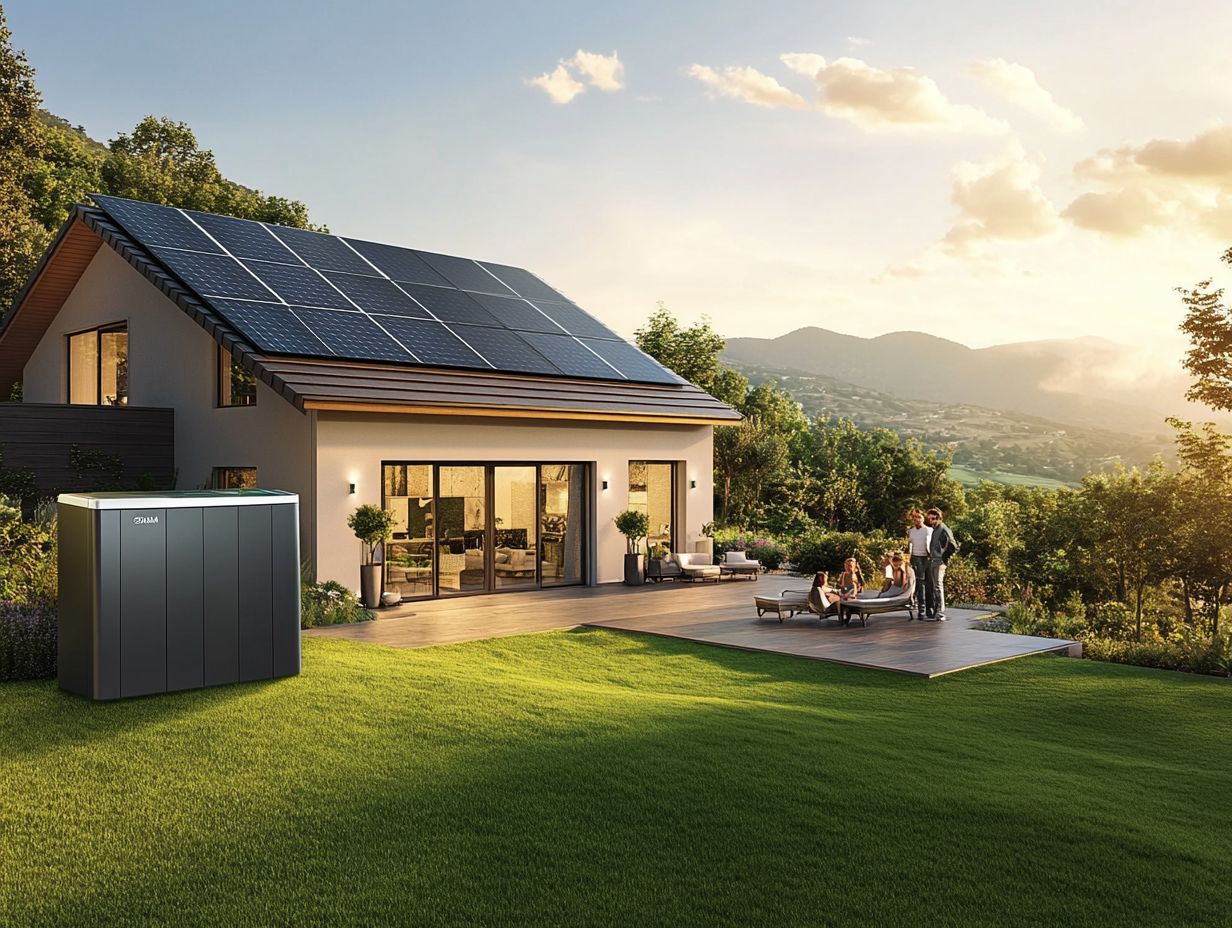
Investing in a home backup power system presents a wealth of advantages, including the invaluable peace of mind that comes during power outages. Imagine enjoying great convenience and saving money over time!
With reliable energy storage, you can keep important appliances running, fostering not only your energy independence but also your financial well-being. Embracing this upgrade means you’re taking a proactive step towards a more secure and empowered lifestyle. Consider exploring DIY solutions for home energy storage to enhance your setup.
Peace of Mind and Convenience
One of the primary advantages of a home backup power system is the peace of mind it affords you during unexpected power outages. This ensures that your essential appliances remain operational. Picture this: a severe storm knocks out power for hours or even days. With a backup power system in place, you can keep your refrigerator humming along to prevent food spoilage.
You ll maintain comfortable heating or cooling and ensure that vital medical devices continue to operate. The ability to charge your phone or access Wi-Fi allows you to stay connected with loved ones during emergencies, easing feelings of isolation and anxiety.
Ultimately, these backup systems transform potentially stressful situations into manageable ones, reinforcing not just your safety, but also your overall sense of security.
Cost Savings and Energy Independence
Home backup power systems can lead to substantial cost savings by reducing your reliance on utility companies and lowering your electric bills. This ultimately promotes energy independence.
By harnessing renewable energy through solar panels and efficient energy storage solutions, you can minimize energy expenses while contributing to environmental sustainability. Using tools like the Tesla Powerwall can also improve your energy management.
These systems often provide access to government incentives and rebates, further enhancing their financial appeal. Don’t miss out on tax credits for solar energy installations; act now to save money!
In the long run, reducing peak electricity rates can lead to impressive cumulative savings, making these systems a wise investment. For those considering energy options, solar energy storage: pros and cons highlight the benefits of such systems. During outages, a backup power system ensures continuous operation of essential appliances without the added costs typically associated with fuel generators, offering you both economic benefits and peace of mind.
Ultimately, integrating this technology gives you the power to take control of your energy future, aligning convenience with financial prudence. Check out EnergySage for great tips on choosing the right system for your home!
Frequently Asked Questions
What is energy storage for home backup power?
Energy storage for home backup power refers to the use of batteries or other devices to store excess energy generated by a home’s renewable energy system or from the grid. This stored energy can power essential appliances and electronics during outages or high-demand periods.
Why should I consider energy storage for home backup power?
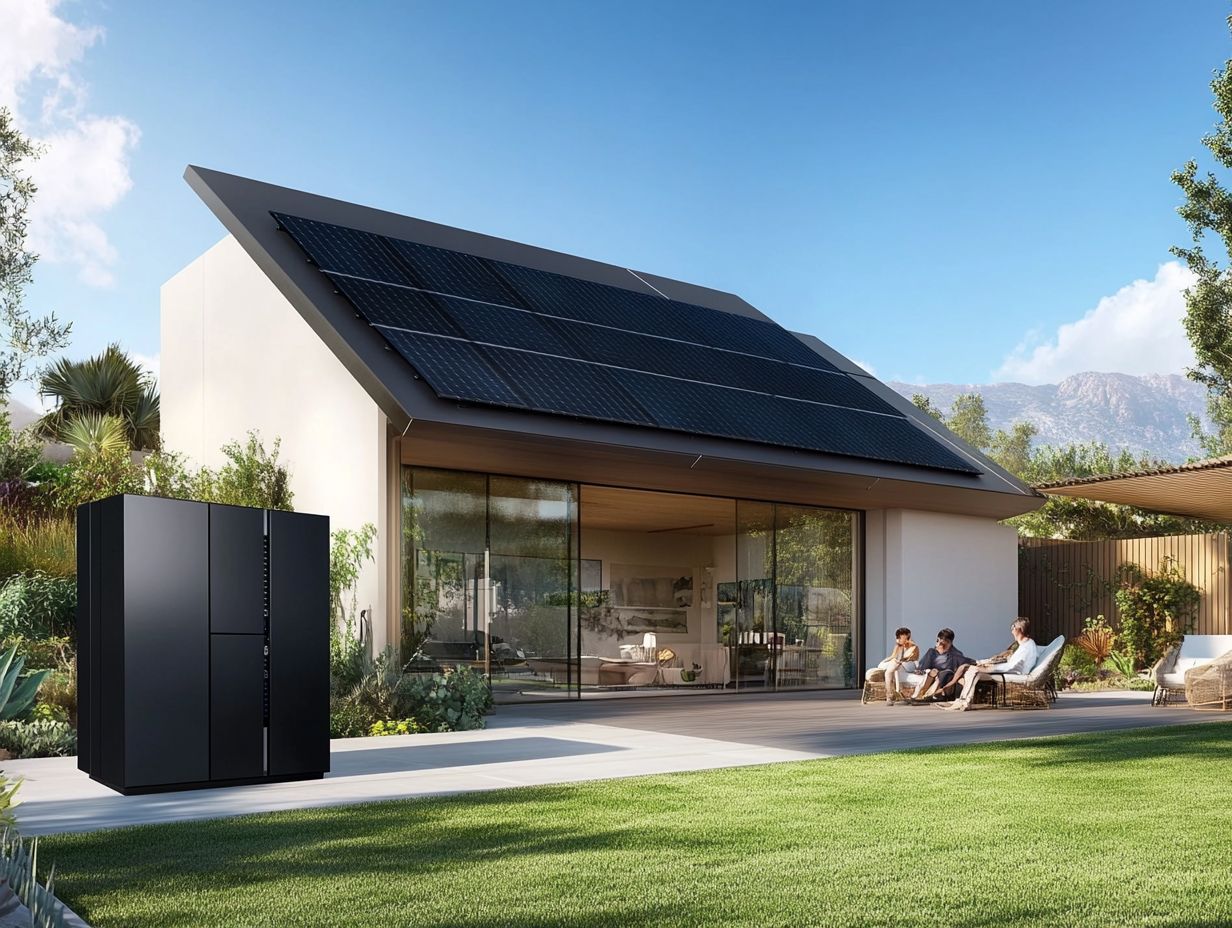
Energy storage for home backup power provides peace of mind by ensuring your home will have power during emergencies. It also helps you reduce reliance on the grid and potentially save money on energy bills by using stored energy during peak pricing periods.
What types of energy storage systems are available for home backup power?
Several types of energy storage systems are available, including lead-acid batteries, lithium-ion batteries, and flow batteries. Each system has advantages and considerations, so it’s important to research and choose the best option for your needs. Newer models like the Powerwall 2 and Powerwall 3 offer advanced features worth considering, especially in states like California, where incentives from companies like SMUD can be beneficial.
How long can energy storage systems power my home during an outage?
The duration that energy storage systems can power your home during an outage depends on the system’s size and capacity, as well as the amount of energy being used. It’s important to calculate your home’s energy needs and choose a system with enough storage capacity to meet those needs during the desired duration of backup power.
Does energy storage for home backup power require maintenance?
Most energy storage systems for home backup power do not require regular maintenance, but it’s important to follow the manufacturer’s guidelines for periodic inspections. This may include monitoring battery levels, checking for malfunctions, and ensuring proper ventilation for the system.
Are there any incentives or rebates for installing energy storage for home backup power?
Yes, many states and utilities provide incentives and rebates for energy storage systems. These programs make it easier for homeowners to install backup power solutions.
Energy storage systems, like batteries, store electricity for later use. Don t miss out on these great opportunities! Explore incentives today to make backup power more affordable for your home.

